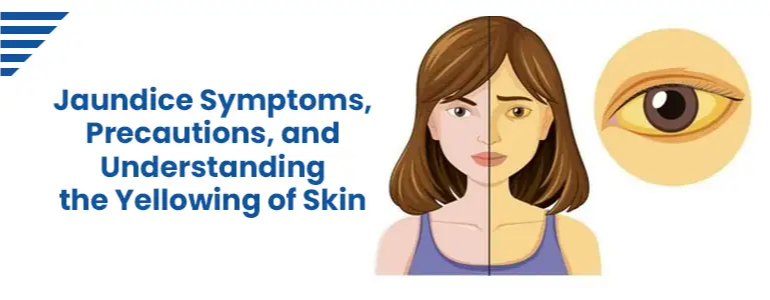Jaundice Symptoms, Precautions, and Understanding the Yellowing of Skin

Jaundice is a condition that often raises concern due to its distinctive symptom of yellowing skin and eyes. Understanding the underlying causes, recognizing signs, and taking necessary precautions to manage and prevent jaundice effectively is essential. In this blog, we'll explore the symptoms of jaundice, its potential complications, and precautions critical to safeguard your health.
Understanding Jaundice:
The yellowing of the skin is a sign of jaundice skin and eyes, resulting from an excess of bilirubin, a yellow pigment formed during the breakdown of red blood cells. The buildup of bilirubin can occur due to various factors, including liver issues, blood disorders, or blockages in the bile ducts.
Common Symptoms of Jaundice:
-
Yellowing of the Skin and Eyes: The most prominent and recognizable sign of jaundice is the skin's yellow discolouration and the eyes' whites.
-
Dark Urine: Jaundice can cause urine to appear dim or tea-coloured due to excess bilirubin.
-
Pale Stools: Stools may become pale or clay-coloured as bilirubin is not excreted correctly.
-
Fatigue: Elevated bilirubin levels can lead to general fatigue and weakness.
-
Abdominal Pain: In some cases, abdominal pain or discomfort may be present.
-
Itching: Excess bilirubin can accumulate in the skin, leading to itching or burning sensation.
Precautions and Management:
-
Consult a Healthcare Professional: If you experience signs of jaundice, seek medical attention promptly for proper diagnosis and treatment.
-
Hydration: Stay well-hydrated to support liver function and the elimination of bilirubin.
-
Healthy Diet: Consume a balanced diet of fruits, vegetables, and whole grains. Avoid fatty and processed foods.
-
Alcohol Abstinence: If the cause of jaundice is related to liver function, avoid alcohol altogether.
-
Medication Review: Consult your doctor before taking any medications, as some can exacerbate jaundice.
-
Rest and Recovery: Let your body rest and recuperate throughout the healing process.
-
Follow Medical Advice: Adhere to your healthcare provider's treatment and follow-up appointment recommendations.
When to Seek Medical Attention:
Jaundice can result from various underlying conditions, some of which may be serious. It's crucial to seek medical attention if you experience:
- Severe abdominal pain or swelling
- High fever
- Confusion or changes in mental state
- Bleeding tendencies or easy bruising
- Dark or bloody stools
Conclusion:
While jaundice can be concerning, understanding its symptoms and taking necessary precautions can contribute to effective management and a smoother recovery. Timely medical attention, healthy lifestyle choices, and adherence to medical advice are crucial to addressing jaundice and maintaining overall well-being. If you or someone you know experiences symptoms of jaundice, consult a healthcare professional for proper evaluation and care.
Frequently Asked Questions
What causes jaundice?
Jaundice can result from various factors, including liver diseases, excessive breakdown of red blood cells, bile duct obstructions, and certain medical conditions.
Is jaundice a disease itself?
Jaundice is a sign of a health problem rather than an illness. It suggests that the body's bilirubin levels are out of equilibrium.
Is jaundice contagious?
No, jaundice itself is not infectious. It manifests as an internal health problem and cannot be transmitted from person to person.
Can newborns develop jaundice?
Yes, newborns can create a type of jaundice known as neonatal jaundice. It is usually a temporary and common condition caused by the immaturity of the baby's liver.
Are all forms of jaundice severe?
The severity of jaundice depends on its underlying cause. Some cases of jaundice may be relatively mild and resolve independently, while others may require medical intervention.
Can I prevent jaundice?
While you cannot always avert jaundice, you can take precautions by maintaining a healthy lifestyle, staying hydrated, avoiding alcohol and certain medications, and seeking prompt medical attention when needed.
Are there different types of jaundice?
Yes, jaundice can be categorized into three main types: pre-hepatic (caused by excessive red blood cell breakdown), hepatic (caused by liver disease), and post-hepatic (caused by bile duct obstruction).
Is jaundice painful?
Jaundice itself usually doesn't hurt. But the underlying illness that produces jaundice might also create symptoms like discomfort or stomach pain.
Can I treat jaundice at home?
Home remedies may help alleviate some symptoms, but seeking professional medical advice for proper diagnosis and treatment is essential, especially if jaundice persists.
Is it safe to continue breastfeeding if my newborn has jaundice?
In most cases, breastfeeding can continue even if a newborn has jaundice. However, monitoring the baby's health and following healthcare professionals' guidance is essential.
Can jaundice lead to long-term complications?
If jaundice is not treated effectively, depending on the underlying cause, problems may result. It's crucial to deal with the underlying issue and heed medical advice.
Can lifestyle choices affect the risk of jaundice?
Yes, maintaining a healthy lifestyle, including a balanced diet, staying hydrated, avoiding excessive alcohol consumption, and practising safe hygiene, can contribute to overall liver and lower the incidence of jaundice.
Book Appointment
Our Locations Near You in Hyderabad
3KM from Banjara Hills
1.9KM from Yusufguda
3KM from Madhura Nagar
5KM from Shaikpet